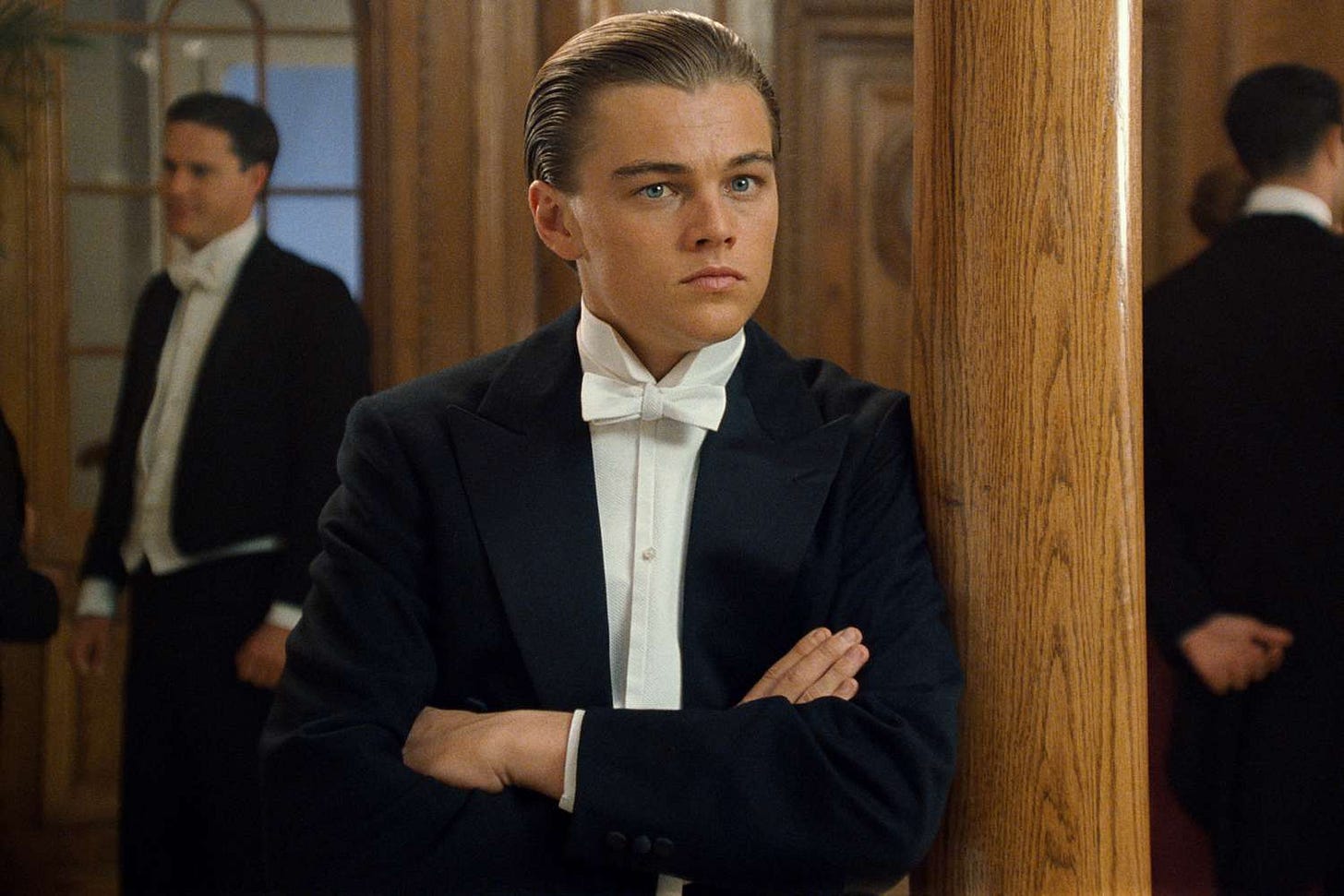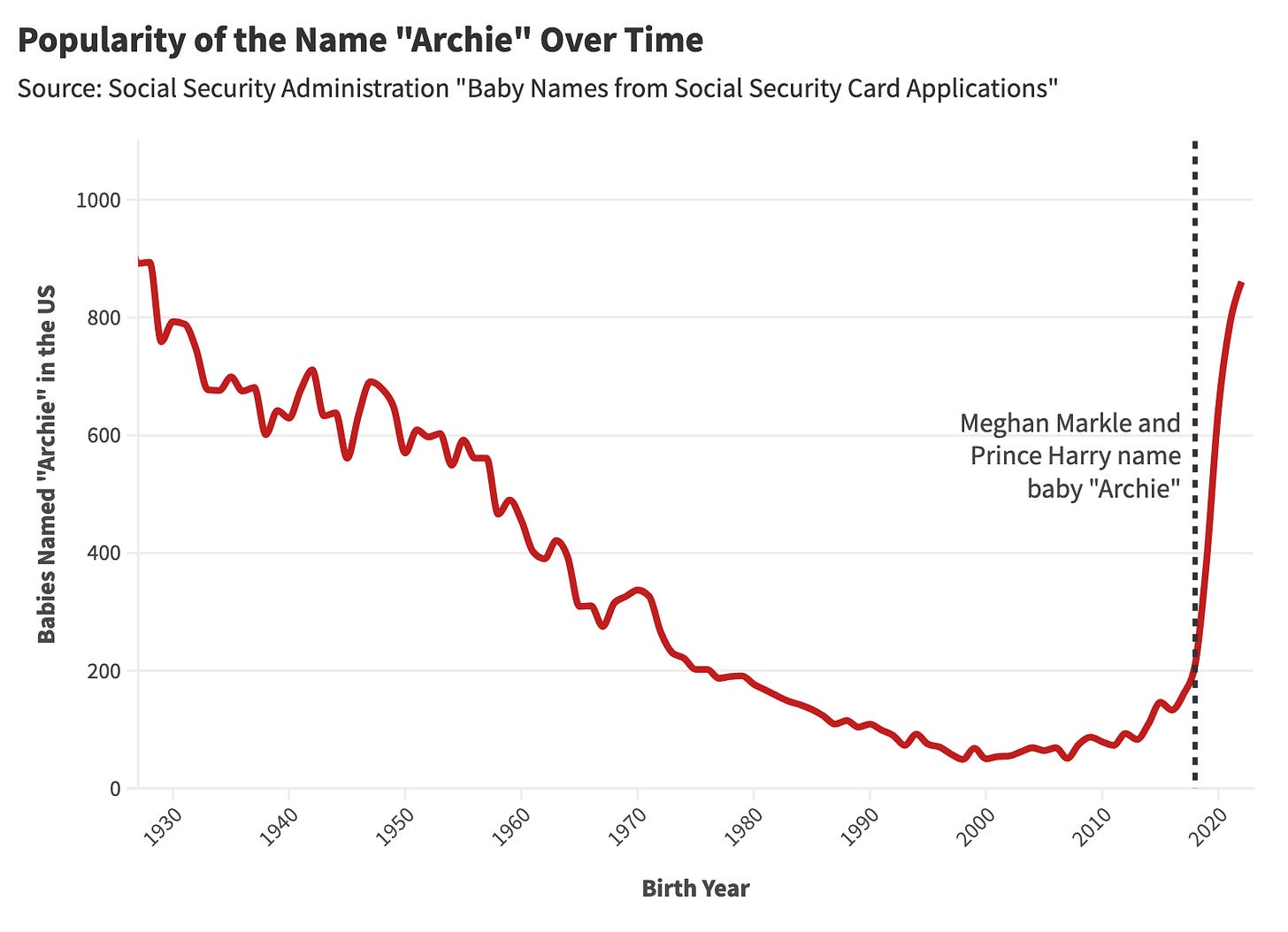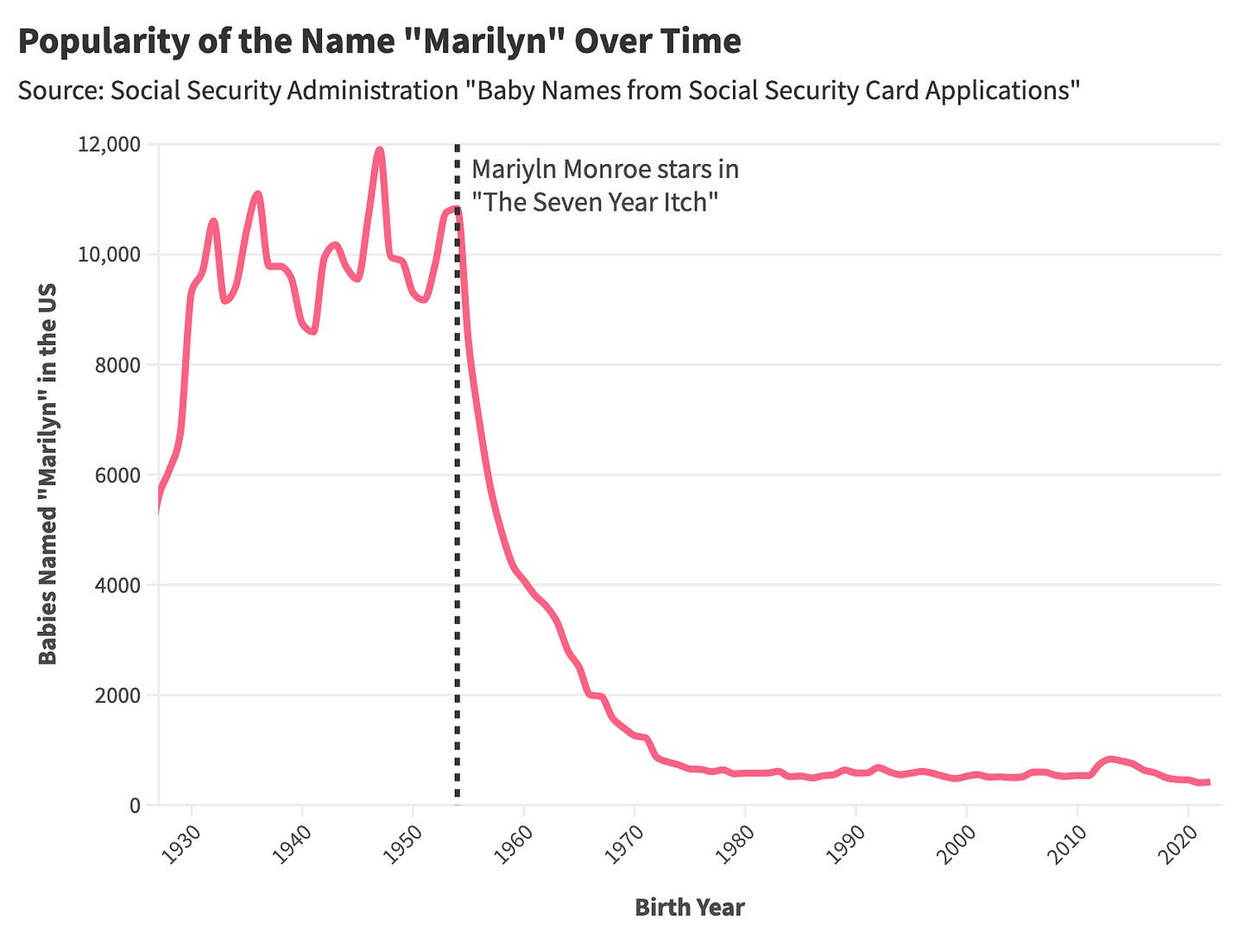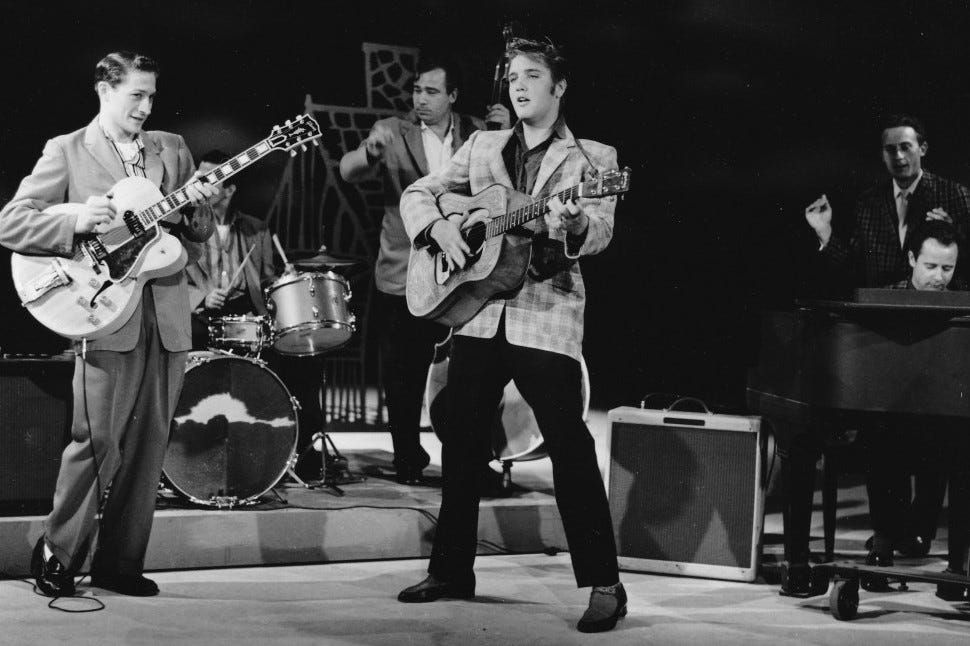Which Celebrities Popularized (or Tarnished) Baby Names? A Statistical Analysis
Which public figures impacted baby naming trends?
Welcome to the 131 new subscribers who signed up for Stat Significant since our last article! I hope you enjoy this week’s exploration of the relationship between celebrity culture and baby naming trends.
If you want to discuss data and statistics or need help with an analytics project, email me at daniel@statsignificant.com or connect with me on LinkedIn.
Intro: The Science of Naming
Nominative determinism is the theory that people's names bear meaningful influence on life outcomes—such as profession, personality, and economic property. The term was first introduced in the magazine New Scientist in 1994 after the publication's "Feedback" column noted several studies authored by researchers with remarkably fitting surnames. These examples include a book on polar exploration by Daniel Snowman and an article on urology by researchers with the last names Splatt and Weedon.
But the nominative determinism phenomenon goes beyond mere happenstance. In some cases, a name's introduction or sudden popularization is tied to the perceived traits of a well-known namesake, with parents hoping their child embodies certain characteristics by association—perhaps bettering their life's trajectory.
A few months ago, I explored the influence of popular movies on baby names and uncovered several striking examples of cause-and-effect, including "Elsa" from Frozen, "Ariel" from The Little Mermaid, “Forrest” from Forrest Gump, and "Trinity" from The Matrix.
In returning to this dataset, I wanted to understand whether real-life figures could inspire naming trends—elevating or stigmatizing a word for an entire generation of parents. Movie characters are created to be valorized and often exemplify the best of humanity, like Forrest Gump's unabashed kindness or Trinity's other-worldly fighting prowess. Can actors, musicians, and politicians elicit the same effect?
So today, we'll explore the historical figures and pop icons that popularized (or tarnished) certain names and identify a few unfortunate trends underlying the mysterious hivemind that is baby naming.
Which Public Figures Popularized a Name?
The term "zeitgeist" refers to the defining cultural touchpoints and social attitudes that characterize a historical period. This concept has become increasingly relevant with the rise of mass media like TV, movies, Instagram, and TikTok. Widely seen entertainment products—be it a popular show or blockbuster film—amplify and reflect the zeitgeist by disseminating shared iconography and reference points.
Consider "The Ed Sullivan Show," one of America's most popular television programs of the mid-20th century. Live "Ed Sullivan" performances by The Beatles and Elvis are often regarded as inflection points in these artists' rise to fame—a singular moment when these figures were introduced to the American public and catapulted into mainstream stardom.
In the case of Elvis, his entry into the zeitgeist spawned an uptick in babies named in his likeness—the same goes for his untimely passing in the 1970s.
In 1997, Titanic became a cultural sensation and the highest-grossing movie of all time. The film turned Leonardo DiCaprio into a "heartthrob," marking the beginning of a distinguished acting career and spawning a generation of babies named Leonardo.
In 1996, the year before Titanic premiered, 557 babies were named "Leonardo." By 2022, this number had increased to ~4,300.
In 2010, Zendaya rose to prominence on the Disney Show "Shake It Up" and later went on to starring roles in 2019's "Euphoria," the Dune franchise, and 2024's Challengers. Prior to Zendaya's celebrity, the moniker was scarcely used and did not appear in the Social Security dataset (due to low volume). Now, with each hit show and movie featuring its namesake, the name's popularity continues to grow.
A celebrity's nominative influence also extends to their baby naming choices. There have been several high-profile offspring that inspired a generation of copycat namings, including Gwyneth Paltrow's "Apple," Beyoncé and Jay-Z's "Blue Ivy," and Meghan Markle and Prince Harry's "Archie."
Barring some degree of coincidence, a prominent individual's rise and presence in the zeitgeist can undeniably shape naming trends—but what about the reverse? Can one celebrity forever ruin a word? Have infamous characters like Harvey Weinstein and Woody Allen sullied their forenames?
Enjoying the article thus far and want more data-centric pop culture content?
Can a Public Figure Ruin a Name?
Broadly speaking, excessive low-brow tabloid coverage can trigger an immediate decline in the popularity of a name.
Marilyn Monroe rose to fame in the 1950s, becoming a global sex symbol through iconic roles in films like Gentleman Prefer Blondes and Some Like It Hot. Her personal life, marred by high-profile relationships and mental health struggles, made her a constant subject of tabloid fascination.
In 1955, Marilyn Monroe starred in The Seven Year Itch, a movie about a married man's "itch" for adultery. The film is famously remembered for an iconic shot of a street vent blowing air up Monroe's dress.
Curiously, that same year marked the beginning of a sharp decline in the popularity of the name "Marilyn"—its fall inversely correlated with Monroe's rising celebrity.
The specific factors behind Marilyn's declining usage are hard to pinpoint, though the timing suggests that relentless tabloid scrutiny and intense media sexualization likely played a role.
Indeed, persistent press coverage can elevate an otherwise ordinary person into a household name, indelibly linking their name to scandal.
Following the Clinton-Lewinsky affair, the name "Monica" experienced a sharp decline in popularity, a direct result of merciless media attention and widespread public shaming.
Alas, Monica Lewinsky is just one of the scandal's key figures who left a mark on naming trends. Both "Monica" and "Hilary" saw their popularity decline in the wake of Bill Clinton's various scandals, while the forename "Bill" remained unaffected.
Over the past thirty years, few public figures have faced as much scrutiny as Hilary Clinton. Unsurprisingly, this relentless criticism has coincided with a significant decline in the name "Hilary," a trend that began around Bill Clinton's election in 1992.
Curiously, this precipitous drop began well before Hilary's 2008 and 2016 presidential campaigns, the Lewinsky scandal, or her unsuccessful push for healthcare reform as First Lady.
Perhaps Hilary Clinton has always been a polarizing figure—her rise to power immediately rejected by a large swath of the American public. Demystifying Clinton's public image could encompass many books' worth of scholarship, so I'll avoid speculating on the drivers of this disapproval.
So far, you may be noticing that all of these figures are female—a fact that is, unfortunately, not a coincidence.
I was unable to find instances of clear-cut cause-and-effect between an infamous male figure and a decline in naming popularity (with a few notable exceptions, which we'll soon cover). I saw no impact on forename prevalence for the following public figures: Harvey Weinstein, Woody Allen, Lance Armstrong, Bernie Madoff, Bill Cosby, Jeffrey Dahmer (and Epstein), Ted Bundy, Joseph Stalin, Charles Manson, John Wayne Gacy, and Ed Gein.
I did, however, identify naming declines associated with Osama bin Laden, Adolf Hitler, and Vladimir Putin—all of whom are not American.
So what does all this mean? There are two potential takeaways from this assortment of data:
There is No Takeaway: These findings constitute statistical noise—instances of baby naming randomness. We should avoid constructing some all-encompassing theory from a constellation of unrelated data points.
American Scrutiny Varies by Demographic—An Unfortunate Reality That Has a Cascading Impact on Naming Trends:
For Female Public Figures: Women are held to stricter societal standards regarding behavior, gender roles, and sexual norms. Acts of perceived impropriety, scandal, or deviation from convention are harshly judged, resulting in figures like Monica Lewinsky, Hillary Clinton, and Marilyn Monroe (and their names) becoming heavily stigmatized.
For Infamous Non-Americans: Immigrants often face added pressure to conform to Anglo-American cultural norms. Names like Osama, Adolf, and Vladimir starkly conflict with American national identity (given their connection to historical figures), thus creating a strong disincentive against their use.
I don't view these observations as definitive or all-encompassing. Rather, they offer a brief glimpse into the amorphous art that is baby naming—or perhaps the allure of misguided pattern recognition.
Final Thoughts: People Change
A parasocial relationship is a one-sided emotional bond where an individual feels a deep connection to a public figure who is unaware of their existence. For most, this means seeing a beloved actor's movies or having an affinity for one's favorite podcaster. But what if these bonds go beyond mere patronage? And what if that cherished public figure changes?
Consider how the meaning of "Elon" has evolved dramatically over the past two decades—to say the least.
In 2025, Elon Musk is a figure who, if nothing else, could be aptly characterized as "polarizing." Many who previously celebrated Musk's eccentricities and intellectual outputs have taken to displays of self-flagellation and about-face virtue signaling to distance themselves from the world's richest man.
It's become fashionable for Tesla owners to buy bumper stickers condemning Musk (while rationalizing their continued Tesla ownership).
Unfortunately, some of these Tesla-loving Musk-disapprovers likely named their child Elon.
Prevalence of the name "Elon" has significantly increased since 2013, when Tesla's stock value began rapidly appreciating.
It's safe to assume that some of these "Elon" parents may object to Musk's activities over the past few years. So what will they do now? Will they change their child's names? Will they plaster one of those dumb stickers on their child's forehead? Or will they just live with the consequences of their actions?
Schadenfreude aside, the curious case of "Elon" offers a cautionary tale on the perils of parasocial relationships. How deeply can we invest in a figure over whom we have no control?
Naming a child "Elsa" bears little risk because its namesake is a static fictional representation—Frozen is unlikely to piss off a large swath of Americans any time soon. Naming your child after Woody Allen or Kevin Spacey while these figures are still alive and capable of infamy—that comes with risk.
Celebrity culture distracts us with manicured depictions of individuals for us to valorize (or despise), but this valorization (or scandalization) should have limitations. Truly knowing someone is difficult, let alone someone you've never met. You can sell a car, avoid watching a film, or delete a Tweet, but you can't change a birth certificate—even if you named your child "Apple."
Struggling With a Data Problem? Stat Significant Can Help!
Having trouble extracting insights from your data? Need assistance on a data or research project? Well, you’re in luck because Stat Significant offers data consulting services and can help with:
Insights: Unlock actionable insights from your data with customized analyses that drive strategic growth and help you make informed decisions.
Dashboard-Building: Transform your data into clear, compelling dashboards that deliver real-time insights.
Data Architecture: Make your existing data usable through extraction, cleaning, transformation, and the creation of data pipelines.
Want to chat? Drop me an email at daniel@statsignificant.com, connect with me on LinkedIn, reply to this email, or book a free data consultation at the link below.
Want to chat about data and statistics? Have an interesting data project? Looking to produce data-centric editorial content? Email daniel@statsignificant.com
















An alternate theory as to why male names weren't affected is that the names may have been too common. Bill, Ted, John, etc. have so many associations that the most recent terrible person may not be the only (or most salient) person with that name who comes to mind. There's a greater variety of girl's names than boy's names, so fewer girl's names are so generic. And then the effect on names such as Vladimir and Osama may not be only because the name is foreign, but because its foreignness means that it's more rare.
No respect for the 1990 Leonardo bump from the live action Teenage Mutant Ninja Turtles movie??!!